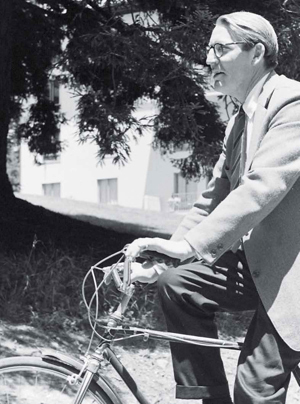Page Smith and his Eulogy for Alan Chadwick
Alan Chadwick
An Appreciation
Dylan Thomas wrote to his father: “Do not go gentle into that good night, rage, rage against the dying of the light.” Alan Chadwick went greatly into the good night at Green Gulch, surrounded by people who loved and cared for him in a beautiful setting where he had started one of his great gardens. The “dying of the light” that Alan raged against was the light of our twentieth century civilization so heedless of the rich bounty of the earth. More than an inspired horticulturalist, Alan was like a furious Old Testament prophet, warning of the wages of our sinful treatment of the land. A visionary, he looked at a barren plot of ground and saw it bloom; the herbaceous border would go just there, opening to an enchanting view of the mountains or the ocean. The herb garden, the garden’s soul, would be here, in inviting terraces. The arbor would be over there. And magically, and by incredible labors, they appeared in time, or at least anticipations of them—at Santa Cruz, in Saratoga, at Green Gulch, Covelo, New Market, Virginia, wherever he paused in his flight from the unendurable realities of our technological society, or simply the obtuseness of humankind.
Every garden contained a penance, concretelike hardplan, often the result of ceaseless tractor tracks, which had to be broken up so that the soil could breathe. This nourished that. That looked like a weed but drew necessary nutriments up from the deeper levels of the ground. Something rested in the shade of something else; and it in turn encouraged another flower or vegetable. It was all a marvelously intricate world of interdependent growing things: nature lovingly domesticated.
In an age of “collective leadership,” Alan Chadwick was as imperious as a king. In a day of carefully modulated tempers and self-conscious “interpersonal relations,” he stormed and raged not just at abstractions like laziness or indifference or inattention but at the poor frail flesh of those who were the destined instruments of his terrible, unflinching will. And then suddenly, being the consummate actor for whom all the world was a stage, he would be as sunny, as playful, as irresistable as the prince of a fairy tale. An exotic past lay dimly behind him–British naval officer, Shakespearean actor, painter of pale watercolors, the remnants of Puddleston china and silver brought out for state occasions, reassuring evidence that he had not, after all, come from outer space as one was sometimes inclined to suspect.
Everything about him was remarkable and distinctive. His physique, his height and angularity, his face, his hair, his walk. Those who fell under his spell had generally to put up with a good deal. That so many were willing to do so is the best possible testimony to the power of what he had to teach, which was inseparable from the way he taught it and the person he was. Mystic, seer, creator, lover of fine wines, coffees, caviar, and champagne, man of prodigious energy and prodigious fury—his life taught us that “nothing great is accomplished without passion.” We will find his spirit in the gardens he or his disciples built, exhorting us to do better, to care more, to work harder, to recklessly expend love on an intractable world, to make the world a garden. And we will find his spirit in his vision of gardens never built but only dreamed of.”
—Page Smith
Reprinted here by permission, courtesy Paul Lee. Photo of Page Smith by Eric Theirmann, used by permission.

